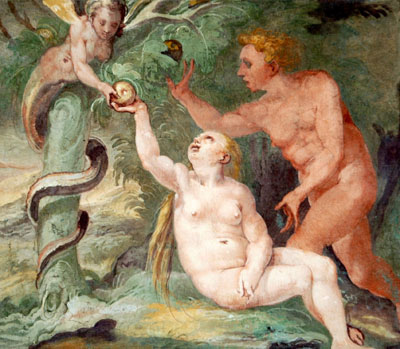(RNS) On the first Monday of September, America honors working stiffs by taking a paid day off. But does Labor Day celebrate an enterprise that God intended to be a punishment?
In a recent New York Times essay on the frenetic hustle of modern life, humorist and author Tim Kreider took the Puritans and their infamous work ethic to task. They had turned toil into a virtue, he argued, whereas God had invented it to chastise the disobedient Adam and Eve.
In an interview, Kreider explained that he was referring to Genesis, in which God tells Adam “by the sweat of thy brow shalt thou eat thy bread.” In the same chapter, the serpent is sentenced to an eternity of belly slithering and Eve condemned to severe childbearing pains.
“Coming as it does on the heels of the infamous Illicit Fruit Incident, the details of which there’s no need to re-hash, certainly makes it sound punitive,” said Kreider, who said he’s a veteran of 18 years of Sunday school, but no Bible scholar.
The idea that original sin ushered in a lifetime of toil is a fairly common Christian view, said Gilbert Meilaender, a professor of Christian ethics at Valparaiso University in Indiana. “Work doesn’t lose a kind of dignity it had even prior to sin, but it takes on that burdensome aspect as well,” he said.
The Creation story makes clear that Adam and Eve were expected to till and maintain the Garden of Eden, said David Jensen, author of “Responsive Labor: A Theology of Work.” The happy couple were, in a sense, co-creators with God. But after the Fall, labor turns toilsome. “It becomes something that oppresses people,” Jensen said.
Even as they acknowledged the often wracking pains of work outside Eden, some evangelicals insist that labor remains, on the whole, a good thing.
“From time to time, I hear someone characterize work as a result of the Fall of man,” Karen Swallow Prior, a professor of English at Liberty University in Lynchburg, Va., wrote in a school publication. “But this is a great error: for, indeed, we were created to work.”

The temptation of Eve. From a 16th century fresco in the Casina of Pius IV, home to the Pontifical
Academy of Sciences. Vatican City.
After all, humans were made in the image of God. And the biblical God worked — unlike those lazy Greek gods who only occasionally descended from their high-peaked home on Mount Olympus. And Jesus was a carpenter, a first-century handyman.
Nobody took work as seriously, though, as the early Protestants, especially the Puritans, who tore down distinctions between sacred and secular. All work, therefore, was on behalf of the Big Bossman in the Sky.
For Calvinists, there was another motivation: a mortal fear that God would leave them off the list of people predestined for salvation. This “salvation anxiety,” in the words of German sociologist Max Weber, led them to seek tangible signs of divine favor, such as frugality and worldly success. Weber’s influential 1905 book, “The Protestant Ethic and the Spirit of Capitalism,” might be summarized: “By working hard and seeing the effect of God’s blessings in my life, I acquire confidence that I am among God’s elect.”
Theology also sets the stage for Mormons’ renowned work ethic, said Matthew Bowman, author of “The Mormon People: The Making of an American Faith.”
Unlike most Christians, Mormons don’t believe in original sin. Rather, they subscribe to the theory of the “fortunate Fall” — that is, Adam and Eve’s mischievous meal was a good thing. It inaugurated free will and set the world’s wheels in motion.
So, when God tells Adam that he’ll have to work for his food, Mormons interpret that as sound advice for spiritual progression, not a punishment. “Mormons subscribe to the idea that work is something that will refine your soul, make you a better person and fine tune your human potential,” Bowman said.
“Work is a key to full joy in the plan of God,” reads a Mormon Sunday school lesson. “If we are righteous, we will return to live with our Heavenly Father, and we will have work to do. As we become like him, our work will become like his work.”
The Sunday school lesson also cites the New Testament's parable of the talents, in which a servant who failed to invest his master's money is cast into outer darkness.
Meilaender, whose book “Working” explores the spiritual side of labor, takes his cue from Luke's Gospel: The parable of the good Samaritan is Christian charity personified. But in the very next passage, Jesus praises Mary, who has left the housework to her sister Martha in order to simply sit beside Jesus.
“The two stories back-to-back illustrate loving your neighbor and loving God, which involves resting from your labors,” Meilaender said. “Somehow the whole Christian life involves both of these.”






